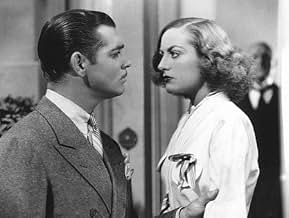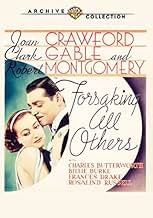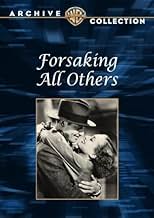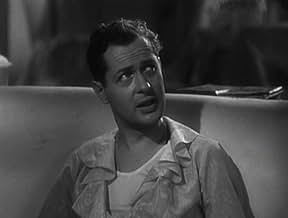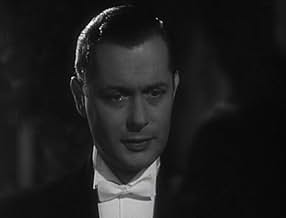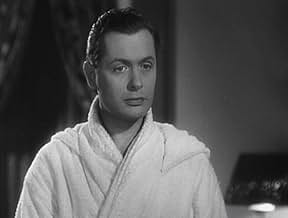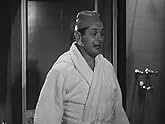AVALIAÇÃO DA IMDb
6,4/10
1,7 mil
SUA AVALIAÇÃO
Adicionar um enredo no seu idiomaWhen Mary's fiance elopes with another woman, her friend Jeff seizes his chance with the jilted bride. Her ex returns, forcing a choice between the men.When Mary's fiance elopes with another woman, her friend Jeff seizes his chance with the jilted bride. Her ex returns, forcing a choice between the men.When Mary's fiance elopes with another woman, her friend Jeff seizes his chance with the jilted bride. Her ex returns, forcing a choice between the men.
- Direção
- Roteiristas
- Artistas
- Prêmios
- 1 indicação no total
Ernie Alexander
- Telegram Messenger
- (não creditado)
Sidney Bracey
- Paula's Chauffeur
- (não creditado)
Oliver Cross
- Party Guest
- (não creditado)
Jan Duggan
- Mrs. Cobal - Customer
- (não creditado)
Jay Eaton
- Party Guest
- (não creditado)
Avaliações em destaque
This is one of the several movies that Joan Crawford made with Clark Gable, and fortunately quite a few of them (maybe all) have made it to at least DVD-R via the Warner Archive. This is one of the best the two did together. It's a romantic comedy in which Joan plays socialite Mary Clay, who is about to marry lifelong acquaintance Dillon Todd (Robert Montgomery). Clark Gable plays another of Mary's lifelong friends, Jeff Williams. Jeff has been long away from home and decides to come back just to ask Mary to marry him, unaware that Mary is about to marry Dillon. When he learns about their upcoming marriage he decides to keep his feelings to himself, although the look he has as if having been punched in the stomach when he hears the news says it all. Robert Montgomery is playing the usual harmless playboy character here that he did so much of in the early 1930's. It looks like Mary and Dillon's marriage is about to go off without a hitch until one of Dillon's old girlfriends appears on the scene.
This film was released about six months after the precode era ended, so there is nothing really racey going on here. About the most extreme thing you will see is Robert Montgomery in a dress. However, W.S. Van Dyke is the director of this film, and he knew how to combine sexual tension and comedy in an age of aggressive censorship, and this is a fine example of his work. I highly recommend it to fans of films of the 1930's.
This film was released about six months after the precode era ended, so there is nothing really racey going on here. About the most extreme thing you will see is Robert Montgomery in a dress. However, W.S. Van Dyke is the director of this film, and he knew how to combine sexual tension and comedy in an age of aggressive censorship, and this is a fine example of his work. I highly recommend it to fans of films of the 1930's.
I have to imagine that in order for MGM to justify using two of their top leading men with Joan Crawford, their parts in Forsaking All Others would have to have been built up considerably. The original Broadway production of this comedy that ran 110 performances in 1933 starred Tallulah Bankhead and it was strictly her show. As if it would have been any other way.
I have to give Joan Crawford credit on this one. Unlike her later film Susan and God where she tries to imitate Gertrude Lawrence with accent and all, she wisely does not try to do a Tallulah impersonation. She creates her own character here and it's a good one. She's got both Robert Montgomery and Clark Gable after her, but she chooses early on and in the end she finds out she chooses wrong. In fact the only impersonation Crawford does is one of her Grand Hotel co-star Greta Garbo.
Both Clark Gable and Robert Montgomery settle into familiar stereotypes for them. Gable is another reporter character like he is It Happened One Night and Montgomery is an irresponsible playboy like he was in a gazillion films.
Montgomery and Crawford are set to be married, but Montgomery leaves her at the altar and runs off with his demanding mistress Frances Drake. But Crawford has Gable's shoulder to cry on for most of the rest of the film. By the way, Drake gives a performance that's a case study in canine feminus. She makes Joan Collins in Dynasty look like Maria Von Trapp. Drake dominates in whatever scene she's in. No way that Tallulah Bankhead would have let that happen on stage.
Charles Butterworth and Billie Burke are also on hand and young Rosalind Russell on her way up has a small part as one of Crawford's friends. Nothing new in Forsaking All Others, but the ground is familiar enough.
I have to give Joan Crawford credit on this one. Unlike her later film Susan and God where she tries to imitate Gertrude Lawrence with accent and all, she wisely does not try to do a Tallulah impersonation. She creates her own character here and it's a good one. She's got both Robert Montgomery and Clark Gable after her, but she chooses early on and in the end she finds out she chooses wrong. In fact the only impersonation Crawford does is one of her Grand Hotel co-star Greta Garbo.
Both Clark Gable and Robert Montgomery settle into familiar stereotypes for them. Gable is another reporter character like he is It Happened One Night and Montgomery is an irresponsible playboy like he was in a gazillion films.
Montgomery and Crawford are set to be married, but Montgomery leaves her at the altar and runs off with his demanding mistress Frances Drake. But Crawford has Gable's shoulder to cry on for most of the rest of the film. By the way, Drake gives a performance that's a case study in canine feminus. She makes Joan Collins in Dynasty look like Maria Von Trapp. Drake dominates in whatever scene she's in. No way that Tallulah Bankhead would have let that happen on stage.
Charles Butterworth and Billie Burke are also on hand and young Rosalind Russell on her way up has a small part as one of Crawford's friends. Nothing new in Forsaking All Others, but the ground is familiar enough.
A better than average comedy that certainly entertains. Plot is believable and somewhat unusual. Clark Gable returns from Madrid (we are not told what he was doing there nor really what anyone does for a living) in order to propose to Joan Crawford. Clark has secretly loved Joan since they were children but in his absence, Joan has agreed to marry Robert Montgomery who she has loved since they were children. Enter the old flame, Frances Drake, who whisks Montgomery away on the eve of his nuptial leaving Crawford standing at the alter. The marriage does not work and soon Crawford steps out with Montgomery on the side. Gable criticizes and consoles Crawford eventually making plans to return to Spain. Good performances by Crawford (opening shot with cream on her face is in contrast to other stars who preferred glamorous introductions), Montgomery (he really is funny), Gable, Billie Burke (who can do "flustered" any better), Rosalind Russell (does well in one of her early films) and a very droll Charles Butterworth. I never thought Frances Drake was believable as the lower class wife but this can easily be overlooked. Recommended as an evenings good entertainment.
This love triangle comedy is worth tracking down for its great script, which is filled to the brim with humorous wit and colorful dialogue that keeps viewers on their toes. (Joseph L. Mankiewicz wrote the screenplay, based on a stage play.) And it certainly helps to have these lines read by the likes of Billie Burke and Charles Butterworth, whose inimitable comedic talents boost the so-so story.
Robert Montgomery's and Joan Crawford's characters grow tiresome after a while, but the film is saved by the performances of Butterworth and Burke in their sidekick roles. Billie Burke is at her fluttery best. Clark Gable is Clark Gable: solid the whole way through. His character is the most likable of the three leads, but he drops out from the middle of the film.
The plot takes some tedious turns, but the ending is satisfying. I like how the scenes at the end of the film mirror the scenes at the start of the film. While I felt the production overall was uneven, I must say that the script really sparkles in places, setting this overlooked comedy apart from the pack.
Robert Montgomery's and Joan Crawford's characters grow tiresome after a while, but the film is saved by the performances of Butterworth and Burke in their sidekick roles. Billie Burke is at her fluttery best. Clark Gable is Clark Gable: solid the whole way through. His character is the most likable of the three leads, but he drops out from the middle of the film.
The plot takes some tedious turns, but the ending is satisfying. I like how the scenes at the end of the film mirror the scenes at the start of the film. While I felt the production overall was uneven, I must say that the script really sparkles in places, setting this overlooked comedy apart from the pack.
Clark Gable, Joan Crawford, and Robert Montgomery are childhood friends who are in not only a love triangle but a love quadrangle in "Forsaking All Others," from 1934.
Crawford is Mary Clay, who is about to be married to Dill (Montgomery). Gable is Jeff Williams, who returns from Spain with the intention of proposing to Mary. When he walks in, there's a party going on celebrating the upcoming wedding. Jeff puts on a brave face as Dill and Mary are two of his closest friends. Dill, however, has some old business, and that's his ex-girlfriend Connie (Frances Drake). Turns out Connie's business isn't as old as Mary and Dill thought because, as Mary prepares to walk down the aisle, Jeff gets a telegram saying that Connie and Dill are married.
This is an entertaining comedy, with the three stars in top form. Montgomery is a riot, and Gable - what can I say. I always liked him, but let's face it, at this point in the 1930s the man was irresistible! That smile! That dimple! And that dynamite screen presence - he's wonderful. And he injects the film with warmth. Though comedy was never Crawford's forte, she actually plays this straight and is very good.
Billie Burke costars and Rosalind Russell has a small role. Good fun.
Crawford is Mary Clay, who is about to be married to Dill (Montgomery). Gable is Jeff Williams, who returns from Spain with the intention of proposing to Mary. When he walks in, there's a party going on celebrating the upcoming wedding. Jeff puts on a brave face as Dill and Mary are two of his closest friends. Dill, however, has some old business, and that's his ex-girlfriend Connie (Frances Drake). Turns out Connie's business isn't as old as Mary and Dill thought because, as Mary prepares to walk down the aisle, Jeff gets a telegram saying that Connie and Dill are married.
This is an entertaining comedy, with the three stars in top form. Montgomery is a riot, and Gable - what can I say. I always liked him, but let's face it, at this point in the 1930s the man was irresistible! That smile! That dimple! And that dynamite screen presence - he's wonderful. And he injects the film with warmth. Though comedy was never Crawford's forte, she actually plays this straight and is very good.
Billie Burke costars and Rosalind Russell has a small role. Good fun.
Você sabia?
- CuriosidadesThe screenplay was written for Loretta Young, George Brent, and Joel McCrea but later was given to Clark Gable, Joan Crawford, and Robert Montgomery.
- Erros de gravaçãoWhen Dill and Mary are driving in the Rolls Royce, the camera pans up from the grill, and the "Spirit of Ecstasy" hood ornament is not there. However, moments later when the camera view changes to the car interior, the ornament can be seen through the windshield.
- Citações
Mary Clay: Jeff, has it ever occurred to you that this is none of your business?
Jeffrey 'Jeff': It's none of my business when I see a dog being whipped, but I'll stop it every time.
- Cenas durante ou pós-créditosIn the opening credits the three stars of the film, Joan Crawford, Clark Gable, and Robert Montgomery are seen walking hand in hand.
- Versões alternativasThere is an Italian edition of this film on DVD, distributed by DNA Srl: "LA DONNA È MOBILE - Widescreen Edition" (in double version 1.33:1 and 1.78:1), re-edited with the contribution of film historian Riccardo Cusin. This version is also available for streaming on some platforms.
- ConexõesFeatured in Thou Shalt Not: Sex, Sin and Censorship in Pre-Code Hollywood (2008)
- Trilhas sonorasForsaking All Others
(1934) (uncredited)
Music by Walter Donaldson
Lyrics by Gus Kahn
Written for the movie and possibly played as background music
Principais escolhas
Faça login para avaliar e ver a lista de recomendações personalizadas
- How long is Forsaking All Others?Fornecido pela Alexa
Detalhes
- Data de lançamento
- País de origem
- Idioma
- Também conhecido como
- Forsaking All Others
- Locações de filme
- Empresa de produção
- Consulte mais créditos da empresa na IMDbPro
Bilheteria
- Orçamento
- US$ 420.069 (estimativa)
- Tempo de duração
- 1 h 23 min(83 min)
- Cor
- Proporção
- 1.37 : 1
Contribua para esta página
Sugerir uma alteração ou adicionar conteúdo ausente

